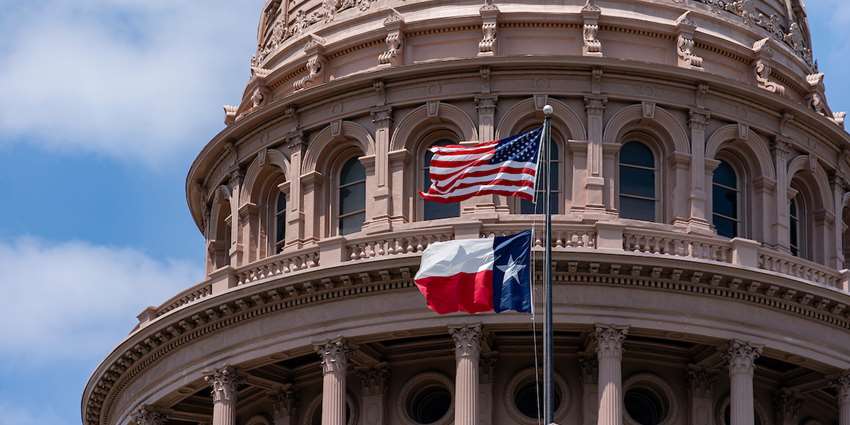The Texas Capitol building in Austin. Photo by Laura McKenzie, Texas A&M AgriLife Marketing and Communications.
Every two years the Texas Legislature convenes in Austin for a whirlwind 180-day session full of meetings, hearings and work. Thousands of bills are filled covering just about any topic you can think of.
Numerous water and natural resources bills have been filed in the 88th Regular Session of the Texas Legislature. Here are just a few water-related bills to watch this session.
Funding
SB 28 Perry / SJR 75 Perry / HB 10 King / HJR 130 King
This bill has passed the Senate, and major water infrastructure funding could result from its passage. SB 28 would establish a new fund within the Texas Water Development Board — the Water Supply for Texas Fund.
This special Texas water fund in the state treasury (outside of general revenue) would fund water supply and infrastructure projects in Texas. Passage of the bill would put it on November’s ballot for Texans to vote for or against “the constitutional amendment creating the Texas water fund to assist in financing water projects in this state.”
SB 2213 Blanco
SB 2213 would create a leaking water wells fund within the state treasury by having the comptroller make a one-time transfer of $18,500,000 from the economic stabilization fund to the credit of the fund. The Texas Commission on Environmental Quality would be tasked with creating the program to provide grants for eligible projects to offset costs. Any leaking water well receiving a grant must be permanently plugged.
HB 3522 / HB 3523 González
HB 3522/HB 3523 would increase the flexibility of the Texas Water Development Board to provide financial assistance to economically distressed and rural areas, through its Economically Distressed Areas Program.
HJR 138 / HB 3165 Holland / SB 2485 Kolkhorst
These bills would create a Texas Land and Water Conservation Fund to provide a long-term state funding source for the conservation of water and natural resources, and it would be jointly governed by several state agencies. Half of the funds would go toward conservation of agricultural lands, water resources and wildlife habitat, and half would go to state and local parks, wildlife management areas and other public access projects. If this bill passes, the fund would be on the November ballot, to be decided upon by voters.
Research
SB 2362 Eckhardt et al / HB 3990 Kacal
This bill looks to create an advisory board that would study the interaction between surface water and groundwater, and require that board to produce a research report on those interactions. The board would be made up of 12 people, including representatives of the Texas Water Development Board, the Texas Commission on Environmental Quality, river authorities, groundwater conservation districts, academic experts in surface water and groundwater, senate water and rural affairs committee, and the office of the governor.
The board will be tasked to host at least one public meeting to hear public comments on issues the advisory board is studying. Those topics are: the extent to which surface water and groundwater interact in Texas, issues arising in Texas from those interactions and ways to mitigate those challenges.
Regulation
HB 4144 Zwiener
This bill aims to amend the Water Code regarding the regulation of the discharge of preproduction plastic by TCEQ. It would require TCEQ to create a plan for monitoring and periodic assessment of each watershed and river basin in Texas. A huge task, local river authorities would monitor and assess their own watersheds under TCEQ supervision to reduce cost. Watersheds involving agricultural or silvicultural nonpoint source pollution will be monitored and assessed by coordinating with the State Soil and Water Conservation Board through local soil and water conservation districts.
Results will provide data to identify significant long-term water quality trends, characterize water quality conditions, support the permitting process and classify unclassified waters.
HB 4144 would also amend the Water Code to include identifying what “preproduction plastic” means.
Sunset
What exactly is the Sunset Commission? Every ten years, each state agency must undergo Sunset Review. Members of the commission assess agency performance and if any changes need to be made. Findings are eventually made into a report that states their opinion based on findings and their suggestions.
This year, the Texas Water Development Board and Texas Commission on Environmental Quality went under Sunset review. Both agencies received positive reports for their work, with minimal recommendations being made. These reports were turned into bills: SB 1351 Perry/ HB 1565 Canales, and SB 1397 Schwertner / HB 1505 Lopez.
How to follow the Texas Legislature
To follow along with specific bills and see status updates, use the Texas Legislature Online Bill Lookup. To search for bills related to a certain topic, use the Bill Search tool.
Follow the House Committee on Natural Resources and the Senate Committee on Water, Agriculture and Rural Affairs for updates from each chamber and follow our partners at Texas+Water to read their frequent Water+Lege updates.


